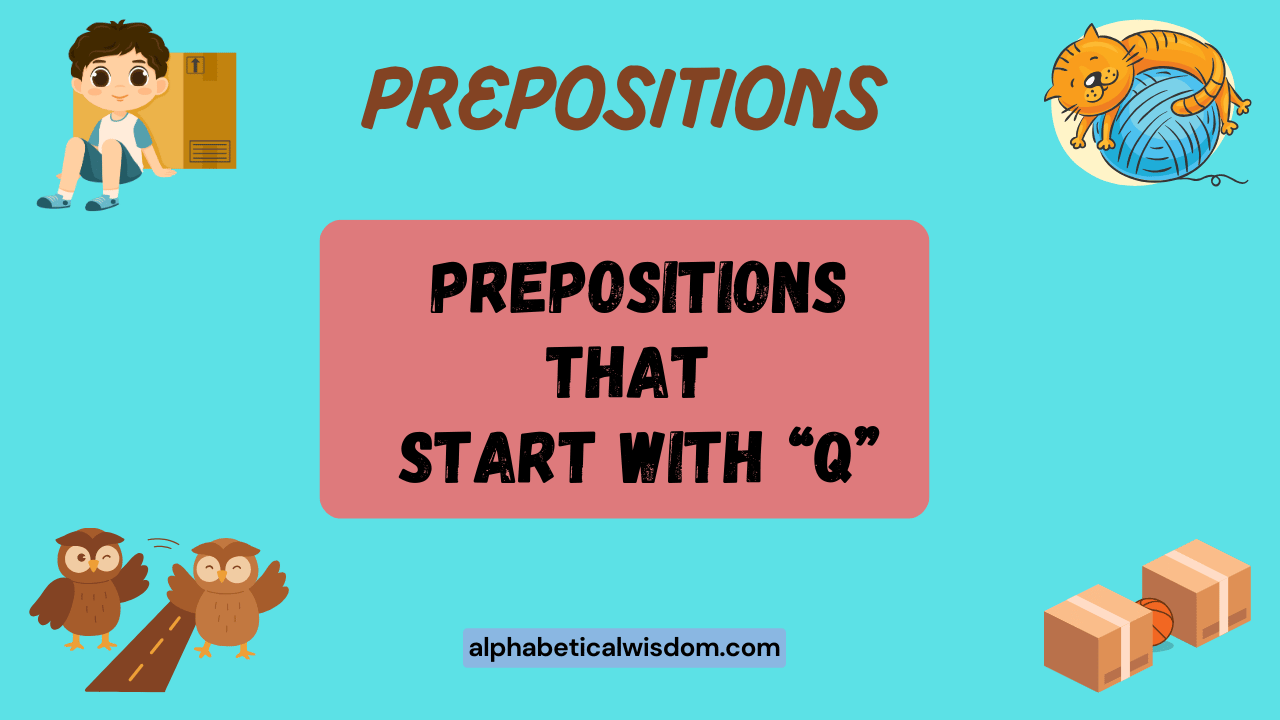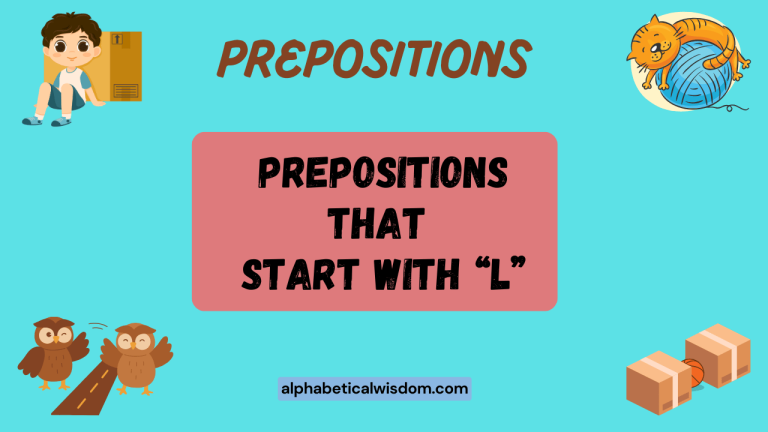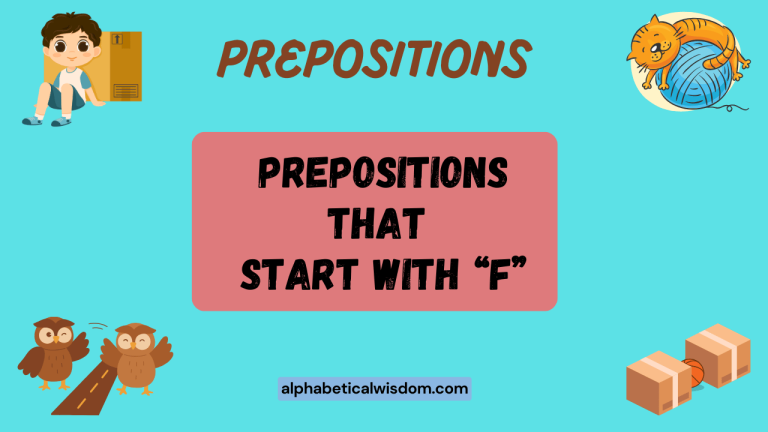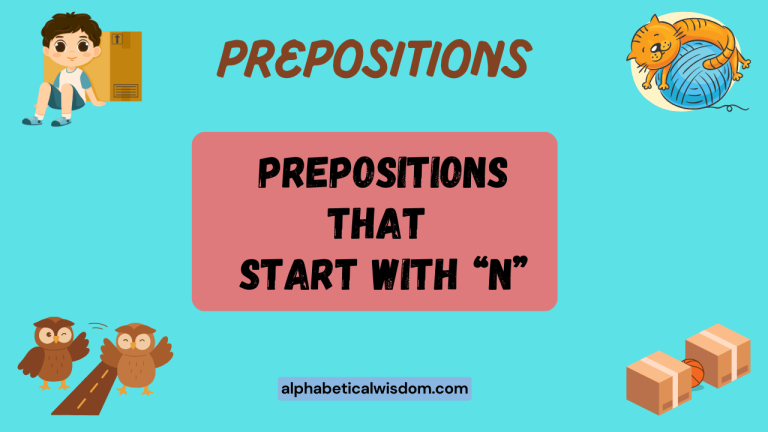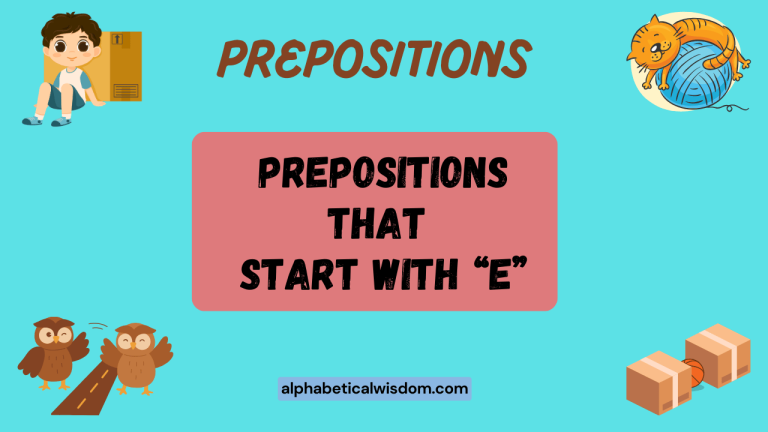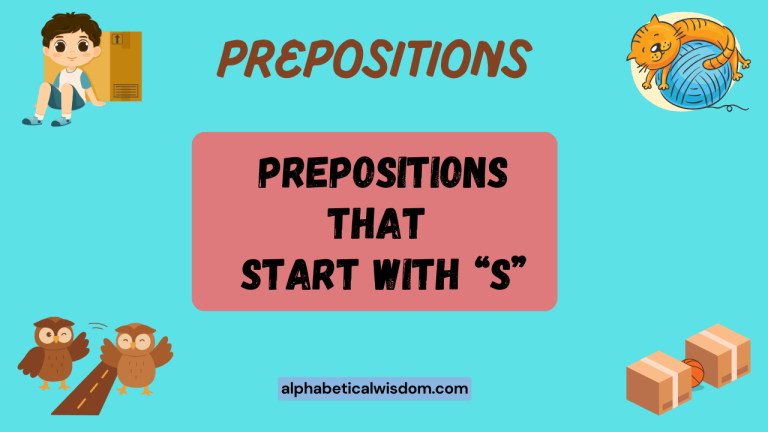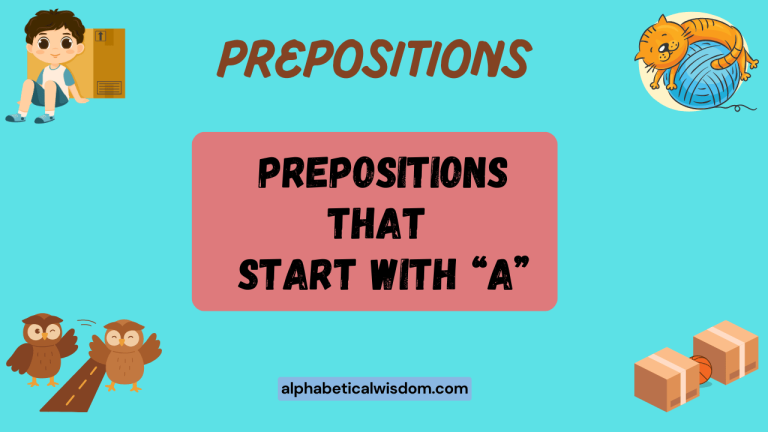Prepositions Starting With ‘Q’: A Comprehensive Guide
Mastering prepositions is crucial for constructing clear and grammatically correct sentences in English. While prepositions like “on,” “in,” and “at” are commonly used, some prepositions are less frequent but equally important.
This article focuses specifically on prepositions that begin with the letter “Q,” exploring their meanings, usage, and providing numerous examples to enhance your understanding. Whether you’re an English language learner or simply looking to refine your grammar skills, this guide will provide you with the knowledge and practice you need.
Understanding the nuances of these less common prepositions can significantly improve your writing and speaking abilities. This guide is designed for English language learners, students, educators, and anyone interested in broadening their grasp of English grammar.
By the end of this article, you will be able to confidently identify and use prepositions starting with “Q” in various contexts.
Table of Contents
- Definition of Prepositions
- Structural Breakdown of Prepositions
- Types or Categories of Prepositions
- Examples of Prepositions Starting With ‘Q’
- Usage Rules for Prepositions Starting With ‘Q’
- Common Mistakes with Prepositions
- Practice Exercises
- Advanced Topics in Prepositional Usage
- Frequently Asked Questions (FAQ)
- Conclusion
Definition of Prepositions
A preposition is a word that connects a noun, pronoun, or noun phrase to other words in a sentence. It typically indicates the temporal, spatial, or logical relationship of the noun phrase to the rest of the sentence. Prepositions usually precede their related noun phrases, which are known as the object of the preposition. Understanding prepositions is essential for constructing grammatically correct and meaningful sentences.
Prepositions function to provide context and clarity by specifying relationships between elements within a sentence. They are crucial for indicating location (in the box), time (at 5 pm), direction (to the store), and various other relationships. Without prepositions, sentences would lack essential details, making it difficult to understand the intended meaning.
In essence, a preposition acts as a bridge, linking a noun or pronoun to other parts of the sentence and establishing a clear connection between them. This connection is vital for conveying precise information and ensuring effective communication.
Structural Breakdown of Prepositions
Prepositions can be simple (e.g., at, in, on), compound (e.g., according to, because of), or phrasal (e.g., in spite of, on top of). Regardless of their form, they all serve the same fundamental purpose: to establish a relationship between a noun phrase and other elements in the sentence. The structure of a prepositional phrase typically consists of a preposition followed by its object, which is usually a noun or pronoun.
The basic structure is: Preposition + (Optional Modifiers) + Object. The object of the preposition is the noun, pronoun, or noun phrase that the preposition relates to the rest of the sentence. Modifiers can include articles (a, an, the), adjectives, or other descriptive words that further specify the object.
For example, in the phrase “in the big box,” “in” is the preposition, “the big” are the modifiers, and “box” is the object of the preposition. Understanding this basic structure is crucial for correctly identifying and using prepositions in sentences. The entire phrase “in the big box” is a prepositional phrase, which can function as an adjective or an adverb within the sentence.
Types or Categories of Prepositions
Prepositions can be categorized based on the type of relationship they express. Common categories include prepositions of time, place, direction, and manner.
Each category serves a distinct purpose in conveying information about the relationship between the object of the preposition and other elements in the sentence.
Prepositions of Time
These prepositions indicate when something happens. Examples include at (at 5 pm), on (on Monday), in (in July), before, after, during, until, and since. They help to specify the temporal context of an event or action.
Prepositions of Place
These prepositions indicate where something is located. Examples include in (in the room), on (on the table), at (at the corner), under, over, between, behind, and next to. They provide spatial context, helping to describe the position of an object or person.
Prepositions of Direction
These prepositions indicate movement or direction. Examples include to (to the store), from (from home), into, onto, through, across, and up. They describe the path or direction of an action or movement.
Prepositions of Manner
These prepositions indicate how something is done. Examples include by (by car), with (with care), and in (in a hurry). They describe the way in which an action is performed.
Examples of Prepositions Starting With ‘Q’
While prepositions starting with the letter “Q” are rare in modern English, it’s essential to understand their historical usage and contexts where they might still appear. The most common preposition starting with “Q” is ‘qua’.
Examples Using ‘Qua’
The Latin word “qua” is occasionally used in English, primarily in formal or legal contexts. It means “in the capacity of” or “as.” It indicates the role or function someone or something is acting in or being considered as. Understanding its usage can be helpful in interpreting formal documents or academic texts. The preposition ‘qua’ is generally used to specify a particular role, function, or capacity in which someone or something is acting or being considered.
The following table provides examples of how ‘qua’ is used in sentences. Note the formal or specialized context in which it typically appears.
| Example Sentence | Explanation |
|---|---|
| He attended the meeting qua representative of the company. | He was present at the meeting in his role as the company’s representative. |
| She spoke to the assembly qua head of the department. | She addressed the assembly in her capacity as the department head. |
| The document was submitted qua evidence in the case. | The document was presented as evidence for the legal case. |
| He acted qua trustee of the estate. | He performed his duties as the trustee of the estate. |
| The information was provided qua confidential. | The information was given with the understanding that it was confidential. |
| She reviewed the proposal qua expert in the field. | She assessed the proposal based on her expertise in the field. |
| He was invited qua guest speaker for the event. | He was invited to speak at the event as a guest speaker. |
| The funds were allocated qua emergency relief. | The funds were designated for use in emergency relief efforts. |
| She participated in the discussion qua concerned citizen. | She joined the discussion as a citizen who was concerned about the issue. |
| He signed the contract qua authorized signatory. | He signed the contract as someone authorized to do so. |
| The report was presented qua preliminary findings. | The report was presented as initial results. |
| She served on the board qua non-executive director. | She was a board member in the role of a non-executive director. |
| He advised the team qua senior consultant. | He gave advice to the team as a senior consultant. |
| The project was approved qua strategically important. | The project was approved because it was strategically important. |
| She contributed to the research qua research assistant. | She assisted with the research as a research assistant. |
| He was involved in the project qua project manager. | He managed the project as a project manager. |
| The policy was implemented qua best practice. | The policy was implemented because it was considered best practice. |
| She participated in the survey qua representative sample. | She was part of the survey as a representative of a larger group. |
| He intervened qua mediator between the parties. | He helped settle the conflict as a mediator. |
| The artwork was appraised qua masterpiece. | The artwork was considered a masterpiece. |
| She volunteered qua first-aider at the event. | She assisted as a first-aider at the event. |
| He was asked to attend qua subject matter expert. | He was asked to attend because of his expertise. |
| The evidence was presented qua irrefutable proof. | The evidence was considered irrefutable proof. |
As demonstrated in the table above, the preposition ‘qua’ is used in very specific formal contexts, usually to denote the capacity in which someone is acting or something is being considered. It is more commonly found in legal, academic, or formal writing.
Usage Rules for Prepositions Starting With ‘Q’
The usage of “qua” is governed by its formal nature and specific meaning. It should only be used when you want to explicitly specify the capacity or role in which someone or something is acting. Avoid using it in informal contexts or when a simpler preposition like “as” or “in the role of” would suffice. It is essential that you use ‘qua’ only when you are talking about a specific function or capacity.
Here are some key rules to consider when using ‘qua’:
- Formality: Use “qua” only in formal writing or speech.
- Specificity: Ensure it accurately reflects the capacity or role being described.
- Alternatives: Consider whether a simpler preposition would be more appropriate.
- Clarity: Make sure its use enhances, rather than obscures, the meaning of the sentence.
Understanding these rules will help you use ‘qua’ correctly and appropriately in your writing and speech. Remember, context is key, and the formal nature of ‘qua’ dictates its use in specific situations.
Common Mistakes with Prepositions
Even experienced English speakers sometimes make mistakes with prepositions. These errors can often change the meaning of a sentence or make it sound awkward.
Here are some common mistakes to watch out for, particularly when using less common prepositions like ‘qua’.
One common mistake is using “qua” in informal contexts. Because it is a formal term, using it in casual conversation can sound pretentious or out of place. Another mistake is misinterpreting its meaning and using it when a simpler preposition like “as” would be more appropriate.
Here are some examples of common mistakes and their corrections:
| Incorrect | Correct | Explanation |
|---|---|---|
| He acted, qua, a friend. | He acted as a friend. | “As” is more appropriate in this informal context. |
| She is qua the manager of the store. | She is the manager of the store. | Using “qua” is unnecessary here; it’s a direct statement of her role. |
| I saw him qua yesterday. | [Sentence doesn’t make sense with ‘qua’.] | “Qua” cannot be used to indicate time. |
| He will speak qua tomorrow. | He will speak as a representative tomorrow. | “Qua” doesn’t fit here as it requires a specific capacity or role. |
| She worked qua hard. | She worked hard. | “Qua” cannot be used to describe the manner of work. |
Avoiding these common mistakes will help you use prepositions, including less common ones like “qua,” more effectively and accurately. Always consider the context and meaning you want to convey when choosing a preposition.
Practice Exercises
To solidify your understanding of prepositions and their usage, particularly focusing on ‘qua,’ complete the following exercises. These exercises will test your ability to identify and use prepositions correctly in various contexts.
Exercise 1: Fill in the Blanks
Fill in the blanks with the appropriate preposition or phrase. Some sentences may require ‘qua’, while others may need a more common preposition.
- He attended the meeting _______ representative of the marketing team.
- She spoke _______ an expert on the subject.
- The document was presented _______ evidence in court.
- He acted _______ trustee of the family estate.
- The information was shared _______ confidential.
- She reviewed the proposal _______ consultant.
- He was invited _______ guest speaker at the conference.
- The funds were allocated _______ emergency relief efforts.
- She participated in the discussion _______ a concerned citizen.
- He signed the contract _______ authorized signatory.
Here are the answers to the fill-in-the-blanks exercise above:
| Question | Answer |
|---|---|
| 1. He attended the meeting _______ representative of the marketing team. | qua |
| 2. She spoke _______ an expert on the subject. | as |
| 3. The document was presented _______ evidence in court. | as |
| 4. He acted _______ trustee of the family estate. | qua |
| 5. The information was shared _______ confidential. | as |
| 6. She reviewed the proposal _______ consultant. | as a |
| 7. He was invited _______ guest speaker at the conference. | as a |
| 8. The funds were allocated _______ emergency relief efforts. | for |
| 9. She participated in the discussion _______ a concerned citizen. | as |
| 10. He signed the contract _______ authorized signatory. | as an |
Exercise 2: Correct the Sentences
Identify and correct the sentences that use prepositions incorrectly. If a sentence is correct, mark it as “Correct.”
- He acted qua kindness.
- She is qua the supervisor.
- The report was submitted qua preliminary findings.
- I saw him qua yesterday.
- He acted as a professional.
- She is qua responsible for the accounts.
- He spoke as if he knew everything.
- She worked qua tirelessly.
- He played qua a team member.
- The movie was qua entertaining.
Here are the answers to the “Correct the Sentences” exercise:
| Question | Answer |
|---|---|
| 1. He acted qua kindness. | Incorrect: He acted with kindness. |
| 2. She is qua the supervisor. | Incorrect: She is the supervisor. |
| 3. The report was submitted qua preliminary findings. | Correct |
| 4. I saw him qua yesterday. | Incorrect: I saw him yesterday. |
| 5. He acted as a professional. | Correct |
| 6. She is qua responsible for the accounts. | Incorrect: She is responsible for the accounts. |
| 7. He spoke as if he knew everything. | Correct |
| 8. She worked qua tirelessly. | Incorrect: She worked tirelessly. |
| 9. He played qua a team member. | Incorrect: He played as a team member. |
| 10. The movie was qua entertaining. | Incorrect: The movie was entertaining. |
Advanced Topics in Prepositional Usage
For advanced learners, understanding the nuances of prepositional usage can significantly enhance their command of the English language. This includes recognizing the subtle differences in meaning that can arise from using different prepositions in similar contexts, as well as mastering the idiomatic uses of prepositions.
One advanced topic is the use of prepositions in complex sentence structures. Prepositional phrases can function as adjectives or adverbs, adding layers of detail to sentences.
Mastering their placement and function is crucial for writing sophisticated and nuanced prose.
Another advanced topic is the study of prepositional verbs, which are verbs that are always followed by a specific preposition. These combinations often have meanings that are different from the individual words, and mastering them requires careful attention and practice.
For example, “look after” means “take care of,” a meaning that is not immediately obvious from the individual words “look” and “after.”
Frequently Asked Questions (FAQ)
Here are some frequently asked questions about prepositions, particularly those starting with “Q,” to help clarify any remaining points.
- What is a preposition?
A preposition is a word that connects a noun, pronoun, or noun phrase to other words in a sentence, indicating the relationship between them. - Why are prepositions important?
Prepositions are essential for providing context and clarity in sentences, indicating relationships of time, place, direction, and manner. - Are there many prepositions that start with “Q”?
No, prepositions starting with “Q” are rare in modern English. The most commonly encountered one is ‘qua’. - When should I use “qua”?
Use “qua” in formal contexts to specify the capacity or role in which someone or something is acting. - Can “qua” be used in everyday conversation?
No, “qua” is generally not used in everyday conversation. It is more appropriate for formal writing or legal documents. - What are some common mistakes people make with prepositions?
Common mistakes include using the wrong preposition, omitting prepositions when they are needed, and using prepositions in informal contexts. - How can I improve my understanding of prepositions?
Practice using prepositions in sentences, read widely to see how they are used in context, and pay attention to the specific meanings of different prepositions. - Is ‘qua’ a preposition in all contexts?
Yes, ‘qua’ functions as a preposition when it connects a noun or pronoun to other words in a sentence, indicating the capacity or role. - What are some alternatives to using ‘qua’?
Alternatives to ‘qua’ include “as,” “in the capacity of,” or “in the role of,” depending on the context. - How do I identify a preposition in a sentence?
Prepositions typically precede a noun or pronoun (the object of the preposition) and indicate a relationship between that object and other parts of the sentence.
Conclusion
Understanding prepositions, including the less common ones like those starting with “Q,” is crucial for mastering English grammar. While “qua” may not be frequently used, knowing its meaning and appropriate context can enhance your ability to interpret formal texts and communicate effectively in specific situations. Remember to practice using prepositions in various contexts and pay attention to the nuances of their meanings.
By understanding the definition, structural breakdown, types, usage rules, and common mistakes associated with prepositions, you can significantly improve your writing and speaking skills. Continuous practice and exposure to diverse texts will further solidify your knowledge and enable you to use prepositions with confidence and accuracy.
Remember that mastering prepositions is a journey, and every step you take brings you closer to fluency in English.
